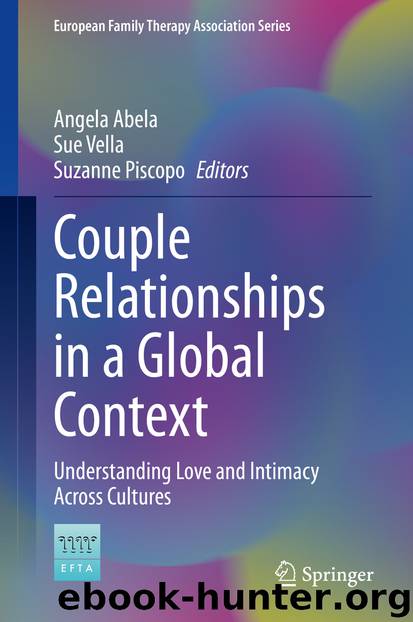Couple Relationships in a Global Context by Unknown

Author:Unknown
Language: eng
Format: epub
ISBN: 9783030377120
Publisher: Springer International Publishing
13.6 What Supports Partners to Adjust Post-Disability?
Relationship permanency after the occurrence of an impairing event has long been cited to be beneficial to the disabled individuals’ quality of life and quality of care (McCabe, McDonald, Deeks, Vowels, & Cobain, 1996). Benefits cited in the literature include less antidepressant use, greater participation in clinical trials and a lower chance of hospitalisation, including at the point of death (Glantz et al., 2009). Indeed a healthy connection between the disabled and the non-disabled partner has been cited to be more important to the disabled person’s life satisfaction than the physical aspect itself (Keefe et al., 2004; McNeff, 1997).
Perceiving the disability as ‘the ultimate test’ for the couple (Dickson et al., 2010, p. 1115), couples who find in each other and in the relationship a sense of accomplishment are strengthened rather than destroyed by the disability. Many individuals who acquire a physical disability have been cited in the literature to state that dealing with their impairment has triggered in them a process of personal growth and increased their feelings of pride and self-worth (Gordon & Perrone, 2004; Schembri Lia & Abela, 2019). Dickson et al. (2010) reported that even though some non-disabled partners testified to the complete loss of their spousal identity post-disability in view of the newfound carers’ roles they had to assume, others reported the emergence of a novel ‘caregiver’ identity, which made them feel proud in their ability to cope and assist their loved ones.
In this regard, partner availability and satisfactory partner support have been found to contribute to the quality of life and stability of the couple relationship over time by enhancing relationship satisfaction (Cutrona, Russell, & Gardner, 2005). Gilad and Lavee (2010) stated that partner availability and support enhances and strengthens trust and security in the relationship and it contributes to a sense of commitment to the growth of the relationship even in the face of adversity. Moreover, supportive attitudes and positive comments from the non-disabled partners also seem to enable success even in the sexual well-being of persons with disability (Li & Yau, 2006). It could be that such behaviours project a sense of acceptance to the disabled individuals, which in turn enables them to develop a positive identity and self-esteem, thereby increasing their chances of sexual satisfaction.
Specific characteristics in the disabled individuals and the non-disabled partners have also been associated to enhance dyadic coping (e.g. Beauregard & Noreau, 2010; Chan, 2000b; Radcliffe, Lowton, & Morgan, 2013). For example, being of a young age, enjoying financial security, having a good sense of optimism as well as having an internal locus of control are characteristics which research has repeatedly associated with better adjustment to physical impairments such as spinal cord injuries. Chan, Lee, and Lieh-Mak (2000) found that the more able to function independently the disabled individual is, the less likely it is for the couple to experience relationship problems. On the other hand, the openness of the non-disabled partners to be with disabled individuals as well as to
Download
This site does not store any files on its server. We only index and link to content provided by other sites. Please contact the content providers to delete copyright contents if any and email us, we'll remove relevant links or contents immediately.
Should I Stay or Should I Go? by Ramani Durvasula(7672)
Why We Sleep: Unlocking the Power of Sleep and Dreams by Matthew Walker(6726)
Fear by Osho(4740)
Flow by Mihaly Csikszentmihalyi(4698)
Rising Strong by Brene Brown(4464)
Why We Sleep by Matthew Walker(4447)
The Hacking of the American Mind by Robert H. Lustig(4385)
How to Change Your Mind by Michael Pollan(4357)
Too Much and Not the Mood by Durga Chew-Bose(4349)
Lost Connections by Johann Hari(4189)
He's Just Not That Into You by Greg Behrendt & Liz Tuccillo(3901)
Evolve Your Brain by Joe Dispenza(3679)
The Courage to Be Disliked by Ichiro Kishimi & Fumitake Koga(3506)
Crazy Is My Superpower by A.J. Mendez Brooks(3406)
In Cold Blood by Truman Capote(3386)
Resisting Happiness by Matthew Kelly(3341)
What If This Were Enough? by Heather Havrilesky(3311)
The Book of Human Emotions by Tiffany Watt Smith(3309)
Descartes' Error by Antonio Damasio(3279)
